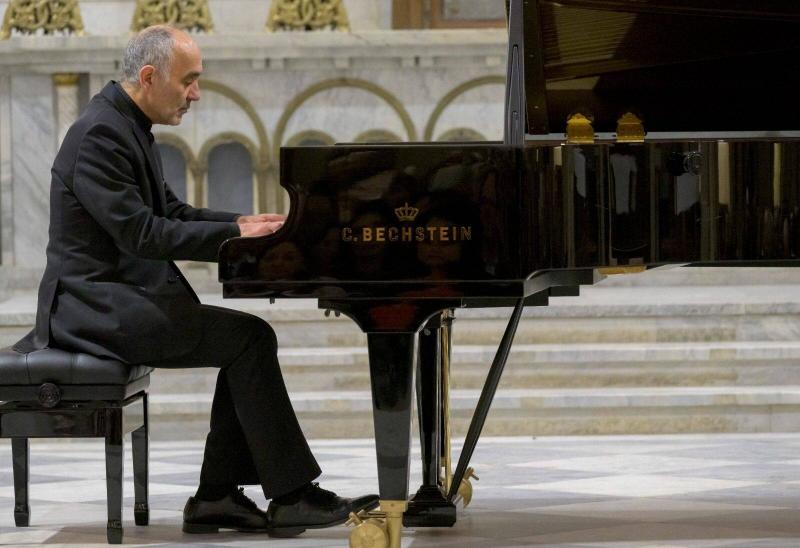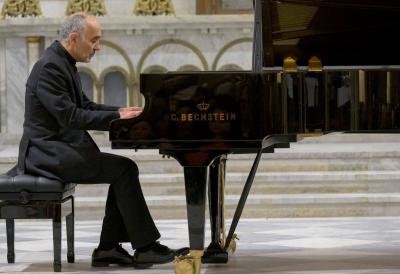The musical event held at Saint Joseph's Church for the Jesuit Fathers in Ashrafieh on the evening of Tuesday, February 27, was not just any symphonic musical celebration that Lebanese people are accustomed to attending at the invitation of the National Conservatory. Despite the significance of these celebrations that the Higher National Institute of Music has been organizing for many years, spreading some joy and hope in the sad Lebanese atmosphere and emphasizing the culture of classical music, this particular occasion was a creative cultural musical event featuring an exceptional guest who embodies Lebanon's bright image in the world: the Lebanese composer and globally recognized pianist Abdul Rahman Al-Basha.
Invited by Dr. Hiba Kawas, the head of the Higher National Institute of Music and a pioneer of Arab opera, and in collaboration with the Friends of the Lebanese Philharmonic Orchestra Foundation and the German Bechstein Foundation, Al-Basha, residing in Paris, came to Beirut to perform at the concert. This was part of a strategy initiated by Kawas to uplift the conservatory and help it recover from the difficulties faced by the institute, just as many state institutions are similarly struggling. This strategy includes numerous executive plans across all musical and academic fields of the institute, including hosting Lebanese expatriate musicians who have shone globally as prominent figures in music.
The event was centered around Abdul Rahman Al-Basha, who has consistently created musical events through his performances with major global orchestras and his presence on the most prestigious stages worldwide. The church was filled with a select group of cultural, musical, political, media, and diplomatic figures, including eight ambassadors from countries: Belgium, Poland, Romania, Spain, Austria, Pakistan, Germany, and Brazil, as well as various MPs and politicians. A significant audience of music lovers also gathered, and a large portion stood or found places to sit on the church pillars or on the floor, eager to experience the performance of the renowned pianist, whose skill filled the atmosphere with music.
Dr. Hiba Kawas warmly welcomed Al-Basha, who then took to the altar/stage where the piano awaited him, greeting the audience with a noble bow. He captivated the audience from the very first moments with his musical program, starting with Johann Sebastian Bach, one of the greatest composers of his era and perhaps of subsequent times. Throughout his performance, he traversed pieces for piano that intertwined strength, intensity, tenderness, lyricism, childhood, dreams, and romanticism.
The scene included a variety of musical forms and styles, with Al-Basha intentionally choosing to contrast his selections. He transitioned from the complex and intricate music of Johann Sebastian Bach, particularly the "Italian Concerto," to the genius of Frédéric Chopin, the "poet of the piano," with its emotional depth and gentle flow in his "Trois Nocturnes opus 9," and then to Chopin's famous "Polonaise," conveying deep musical intensity and emotions. Al-Basha translated these with precision and spiritual elevation through his remarkable skill, allowing listeners to savor the essence of Chopin's music.
With charming agility, he moved into intimate musical realms, bringing forth his own compositions for children, transporting the audience, who were deeply engrossed, to a different space while maintaining a seamless flow throughout his performance from the outset.
Concluding his performance with pieces from Maurice Ravel's "Gaspard de la nuit," Abdul Rahman Al-Basha showcased perhaps the greatest and most challenging works the piano repertoire has to offer. The grandeur of the music, alongside its profound meaning, impressed upon the audience. As they soared with him to infinite horizons filled with rich emotions, Al-Basha's mastery shone through his choice of the most difficult piece ever written for the piano in the history of music.
He exhibited a mastery reminiscent of a wizard, flawlessly embodying the complex harmonic textures and sonic dimensions of Ravel's music. His ethereal approach delved deeply into the piano while simultaneously maintaining a lightness in sound with remarkable technique and complete control over his dexterous fingers. This earned him a major award for his interpretation of Ravel, affirming his place as one of the greatest interpreters of France’s most significant composer, possibly the most beautiful of them all.




